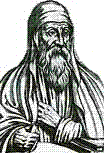
Sola Scriptura home page
Sola Scriptura and the Apostolic Fathers!
Apostolic Fathers used scripture as the primary defense against false doctrine.
|
|
Sola Scriptura home page |
Introduction:
|
|
Mandatory : Apostolic Fathers Catechism Class for Catholics and Orthodox.(You must take our catechism class before you read the truths below.) |
A. Apostolic Fathers believed scripture alone was understandable.
|
|
To the horror of Roman Catholic and Orthodox defenders, the apostolic fathers expected the heretics to correctly interpret scripture. The Apostolic Fathers expected all to interpret scripture and get it right! |
B. Master index of the Fathers on Sola Scriptura:
|
180 AD: Irenaeus |
180 AD: Clement of Alexandria |
200 AD: Tertullian |
|
200 AD: Hippolytus |
250 AD: Cyprian |
325 AD: Athanasius |
|
350 AD: Hilary of Poitiers |
360 AD: Cyril of Jerusalem |
370 AD: Basil |
|
375 AD: Gregory of Nyssa |
400 AD: Jerome |
405 AD: John Chrysostom |
|
425 AD: Augustine |
425 AD: John Cassian |
450 AD: Theodoret |
C. Apostolic Fathers:
Five kinds of Tradition.|
|
|
|
The Apostolic Fathers recognized five different kinds of tradition: |
|
|
|
Tradition #1: Scripture. (2 Tim 3:16-17; 2 Thess 2:15; 3:6) |
|
|
Tradition #2: Verbal inspiration. (Jer 1:9; 1 Cor 11:2; 2 Thessalonians 2:15; 3:6; 2 Tim 2:2) |
|
|
Tradition #3: Expedient tradition. (Roman 14:5) |
|
|
Tradition #4: Uninspired creeds "Rule of Faith". (1 Cor 15:3-6; 1 Timothy 3:16; 2 Timothy 2:8) |
|
|
Tradition #5: False doctrine tradition. (Mk 7:7-9; Col 2:8; 2 Tim 4:2-5) |
|
|
|
D. Catechism class for oral Traditionalists:
|
|
Mandatory : Apostolic Fathers Catechism Class for Catholics and Orthodox.(You must take our catechism class before you read our truths.) |
Apostolic Fathers: Sola Scriptura Creedalists
By Steve Rudd